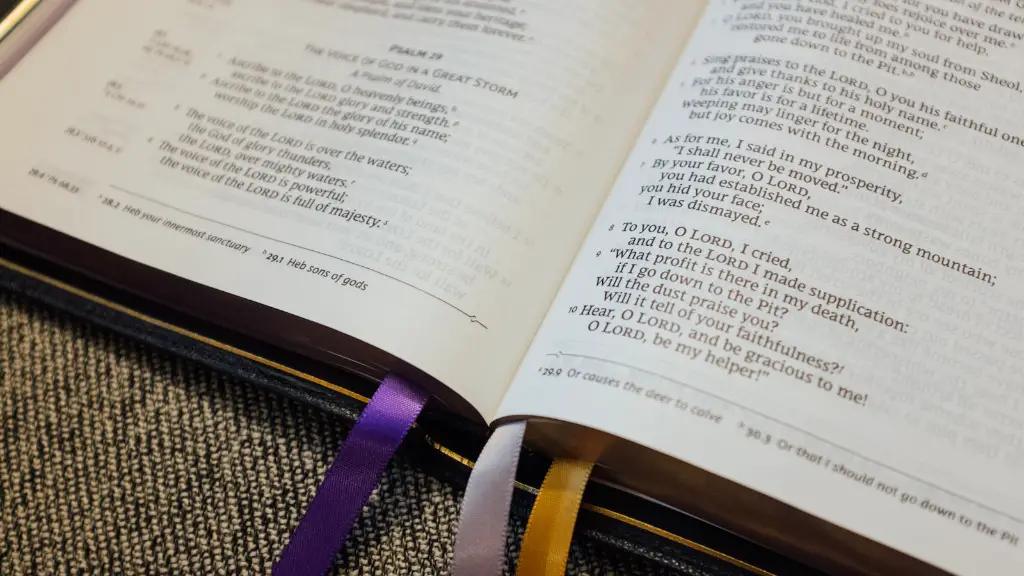It is not difficult to see why many people look to the Bible to inform their views on politics. The Bible is filled with stories of kings and prophets, of taxation and debt, of exile and of leaders. Many people use the Bible as an authority on their political views, basing their understanding of politics from scripture.
When it comes to the specifics of what the Bible says about politics, scripture is divided into two main categories – the prophets and the kings. The prophets spoke of a less political and more spiritual society, while the kings spoke of a more authoritative and hierarchical form of politics. Within these two categories, scripture provides a wealth of guidance on issues such as justice, rule of law, and governance.
The Bible is filled with its writers’ views on justice, often encouraging the rulers to be just and fair to all citizens (Deuteronomy 16:19, Jeremiah 22:3). The prophets exhort rulers to provide fair taxation and justice to the poor (Micah 6:8, Proverbs 14:31). The Bible also provides guidance on how to govern a society. It speaks of the importance of maintaining justice and fairness, as well as emphasizing the need for obedience and humility (Romans 13:1, 2 Corinthians 10:4). Leaders are advised to provide for the poor, the widow, and the oppressed (Isaiah 1:17, Amos 5:24).
In the New Testament, we see Jesus emphasizing the importance of obedience and humility when He says, “Render unto Caesar, the things which are Caesar’s, and render unto God the things that are God’s” (Matthew 22:21). The Bible is also filled with warnings to rulers who do not follow the laws of God and oppress the people (Deuteronomy 17:12-13, Daniel 4:27).
At the same time, the Bible also recognizes the role of secular government, particularly the need for it to be respected and obeyed. Paul writes in Romans 13:1, “Let every soul be subject to the governing authorities”, and in 1 Peter 2:13-14, “Be subject for the Lord’s sake to every human institution, whether it be to the emperor as supreme, or to governors as sent by him”.
This is not to say that the Bible is entirely apolitical. Scholars and interpreters have argued that some of its passages do advocate specific policies and positions on certain issues. For example, some scholars have pointed to certain verses that could be interpreted as advocating distributive justice and economic equality (1 Corinthians 6:7-8; James 5:4-6). Others have found an environmental ethics message in the biblical texts, and have argued that this should inform our views on how we should interact with the natural world (Genesis 1:26-28, Psalms 24:1-2).
Overall, the Bible does not provide a specific policy prescription for governing. Instead, it provides a moral and ethical framework for understanding and engaging with the political world. It is up to individuals to apply and interpret these teachings in order to determine their own views on politics.
Worship and Prayer for Political Leaders
The Bible does, however, encourage its readers to pray for and worship their political leaders. The Apostle Paul writes “I urge, then, first of all, that petitions, prayers, intercession and thanksgiving be made for all people—for kings and all those in authority, that we may live peaceful and quiet lives in all godliness and holiness. This is good, and pleases God our Savior” (1 Timothy 2:1-3). This passage encourages readers to pray for their leaders and have trust in God to provide them with the necessary wisdom to lead their people.
The Bible also speaks of the importance of gratitude and thanksgiving when it comes to leaders. Paul writes in Colossians 3:15, “And let the peace of Christ rule in your hearts, to which indeed you were called in one body; and be thankful.” This verse encourages readers to be thankful for those in authority, trusting that the peace of Christ will rule in the hearts of all who are obedient. This encouragement is truly timeless, and can be applied no matter the era, nation, or situation of a person.
At the same time, it is important to note that the Bible does not advocate for blind obedience or an authoritarian form of government. In fact, several of the books of the Bible call kings to account if they rule unjustly. There are numerous examples of such unique criticisms, including those found in the books of Elijah, Jeremiah, and Daniel. This recognition of the need to hold leaders accountable to the people is an important part of the Biblical narrative.
Is Politics The Responsibility of the Church?
The Bible does not really address if the church is responsible for politics. On one hand, scripture encourages believers to pray for their leaders and to be thankful to them (1 Timothy 2:1-3). On the other hand, the Bible also calls on believers to seek justice and follow their conscience even if it means going against the governing authorities (Acts 5:29). Some theologians argue that the church is to be a prophetic witness for truth, calling its leaders to account when it diverges from the teachings of the Bible. Others argue that the church should not be directly involved in political matters, but should instead focus on matters of faith and spirituality.
It is important to note here that the way we interpret the Bible and our views on politics are informed by our own experiences and perspectives. Ultimately, everyone will come to different conclusions on how to interpret and apply scripture based on their own convictions and personal views. In the end, it is up to individuals to decide how they interpret and apply the Bible’s teachings to current political issues.
Biblical Perspectives on Political Issues
The Bible speaks to a multitude of political issues, as well as a multitude of ways to interpret and understand them. Two broad topics often discussed in relation to Christian views on politics are economic justice and environmental stewardship. With regards to economics, the Bible emphasizes the importance of providing for the poor and dispossessed, and warns of the danger of income inequality and exploitation (James 2:2-4, James 5:4-6). In addition, several passages can be interpreted as advocating for a just and equitable economic system, where the needs of the whole are served (Proverbs 22:2, Isaiah 58:7-8).
On the topic of environmental stewardship, the Bible is also filled with instructions on how we should care for the planet and its resources. There are numerous passages that emphasize the importance of protecting nature and caring for the world God has given us (Psalms 36:6-7, Genesis 1:26-28, Job 28:25-26). In addition, several have argued that the recognition of humanity’s inherent relationship to the environment is a key part of a Christian view on politics.
Modern Political Applications of Biblical Teachings
There is much we can learn from the Bible in terms of our modern political views and attitudes. For example, Paul’s teachings in Romans 13:1-7 emphasize the importance of obedience to authority and the promotion of peace. This has been interpreted as an endorsement of constitutional democracy and the rule of law. Similarly, the teachings of Jesus and the prophets can be used to advocate for social and economic justice, and to promote a more compassionate and equitable society.
At the same time, it is important to remember that the Bible’s teachings are not always straightforward and can be subject to interpretation. Therefore, we must take care to understand and interpret the Bible’s teachings in the context of the time period in which it was written. Furthermore, it is important to remember that the Bible is not a political manifesto, but instead provides a framework for understanding our moral and ethical duties in the political world.
Biblical Values and Political Engagement
The Bible not only provides moral guidance for our political views, but it also speaks of the importance of being actively engaged in the political process. While the Bible does not tell us how to engage in politics, it does challenge us to be actively involved in the lives of our communities. Jesus speaks of how important it is to take the lead on issues of justice and mercy, and exhorts his followers to “do to others as you would have them do to you” (Matthew 7:12). Furthermore, Jesus encourages us to care for the most vulnerable in society, to speak out against injustice, and to engage in peaceful protest and civil disobedience.
The Bible’s teachings on politics are timeless and are as relevant today as they were in antiquity. At the same time, it is important to remember that the Bible does not provide a specific policy prescription on how to govern in a just and responsible manner. Therefore, we must be mindful of our own interpretations and applications of the Bible’s teachings, while also being aware of our responsibility to engage in the political process in a way that reflects its values.
Stewardship and Responsibility to the Nation
The Bible speaks about the importance of being responsible for our actions as citizens of the nation. It emphasizes the idea of stewardship, and calls upon us to take responsibility for our own lives and the decisions we make (Psalms 25:12-13, Deuteronomy 8:18). We are to use our resources wisely, and to use our talents to serve our nation and fellow citizens (Micah 6:8). Furthermore, it is our responsibility as citizens to participate in elections and to contribute to the common good of our communities.
The Bible also speaks about the importance of respecting the laws of the nation (Romans 13:1-7). This includes the responsibility to obey laws, to engage in peaceful protest when needed, and to participate in the political process. At the same time, the Bible also acknowledges that there are times when we may need to take a stand against unjust laws and systems (Acts 5:29). The Bible does not give an explicit answer on how this should be done, but it does encourage us to use our own discernment and judgement in deciding the right course of action.
Conclusion
The Bible has much to say about politics, though its teachings can be interpreted in a variety of ways. Ultimately, the Bible provides us with a moral and ethical framework for approaching political issues and engaging in the political process. It encourages us to pray for our leaders, to be thankful for their rule and to seek justice in our communities. Furthermore, it urges us to be responsible citizens, to take stewardship of our nation and to seek out what is right and just in our political systems and laws.




